Hearken to this story:
Duhok, northern Iraq – Rawnaq Abdulrahman peeks out of the door of her counselling room and invitations Ahmad in. The slim 37-year-old settles throughout from the psychotherapist, his leather-based jacket melting into the comfy leather-based armchair. A lamp floods the room in a heat glow. Images of waterfalls and forests on the partitions and a vibrant rug on the ground transport him to a spot removed from the displacement camp the place he lives.
Past the partitions of this quiet room, rows of hundreds of makeshift tents home Ahmad and different Yazidi individuals who fled conflict to the Kurdish area of northern Iraq.
The session begins with Abdulrahman and Ahmad doing a little respiratory workout routines collectively. Then she asks him to inform her what occurred when ISIL first entered his village in northern Iraq in 2014 and kidnapped 31 of his members of the family.
Ahmad breathes deeply yet one more time and begins his story, taking the psychotherapist by it step-by-step. He pauses at one level and grasps his left arm, which has seized up.
“That is the bodily manifestation of the trauma,” Abdulrahman says to Ahmad and tells him to maintain transferring his legs and stretching his toes whereas he talks, to loosen his physique, and feelings.
Ahmad nods and stretches his legs after which begins his story once more, explaining that he tried to flee his village close to Sinjar, a city with a big Yazidi inhabitants that noticed a few of ISIL’s worst brutality. He fled to the mountains the place he hid for 3 days along with his household, he says. With out meals and water and going through demise within the chilly, they returned to his village.
ISIL captured Sinjar in August 2014, sending practically all of Iraq’s 500,000 Yazidis to hunt refuge within the semi-autonomous Kurdish area, about two hours away by automotive. Throughout the ISIL rampage, the fighters massacred hundreds of males and kidnapped 3,000 ladies and younger ladies, a lot of whom have been stored captive as intercourse slaves.
The horrors inflicted on this ethnoreligious minority didn’t start with ISIL, as they’ve been misunderstood and persecuted for centuries.
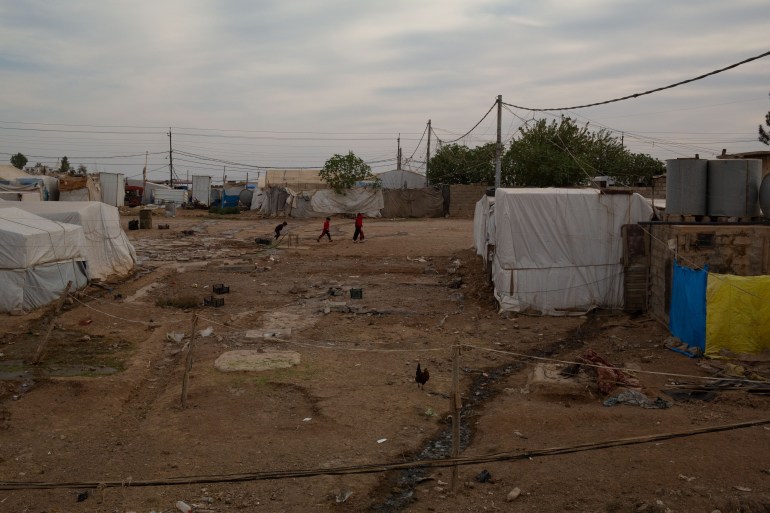
Again in his village, ISIL got here to his dwelling, says Ahmad, pausing to rub at his broad moustache, stress constructing in his brow. He, like others in his prolonged household, gave in to strain to transform to Islam. It was that or face demise, he says. He additionally handed up a second likelihood for him and his household to go away with smugglers, fearing they have been ISIL members making an attempt to trick him.
“I used to be confused, paranoid, apprehensive,” he says, wringing his palms. “I felt eyes all on me all the time. I didn’t belief anybody.” His voice grows louder and extra exasperated and his arm seizes up once more.
Remembering his psychotherapist’s tip, he pauses to take deep breaths and stretches his legs and arms. Then he returns to his story, skipping to the top.
Finally, two years later in 2016, they discovered a technique to escape with smugglers that he trusted, making it to security in Duhok, practically two hours away, however the strain of being unable to help his household of six and life on the camp weighs closely on him. “These burdens are nonetheless inside me,” he says quietly.
After a couple of minutes of silence, the psychotherapist asks what he’s feeling now. He explains that he’s excited about the reduction he felt when he and his household lastly made it to Duhok, however the way it took him time to really feel protected.
He worries about his five-year-old daughter with a incapacity who they left behind with different members of the family. She couldn’t make the journey with out medical help. He was going to return for her. After arriving in Duhok, Ahmad discovered of the deaths of the members of the family caring for her. “Possibly, she is in captivity now,” he whispers, wanting down at his clasped palms.
He desperately desires to return to search for her however doesn’t know the place she is, if she remains to be alive, and fears Sinjar remains to be not protected.
“If I’m going again, who will assist us there? Right here, I’ve Dr Rawnaq,” he says. “And we will make a plan collectively.”
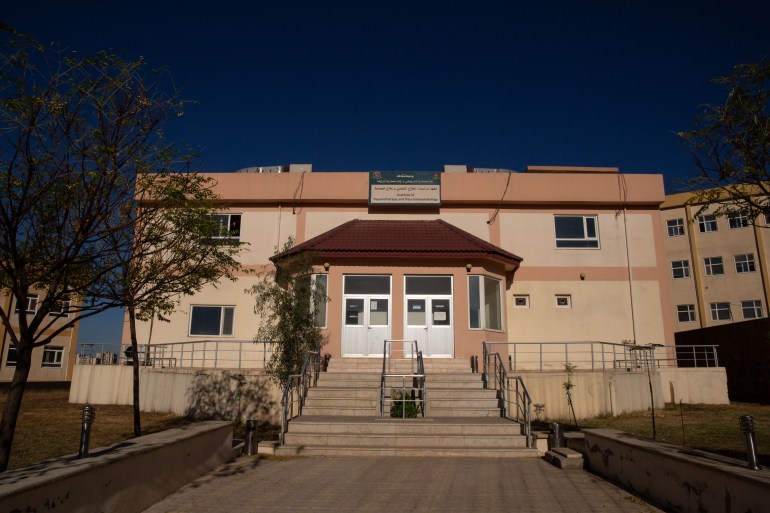
Duhok’s German clinic
The tons of of hundreds of Yazidis within the displacement camps round Duhok undergo the ache left behind by sexual abuse, loss, torture, abduction and multigenerational persecution. Many undergo from PTSD and greater than 12 suicides have been reported within the first three weeks of 2021 alone.
Ahmad receives counselling on the Institute of Psychotherapy and Psycho-traumatology (IPP) German Clinic for Psychotherapy, a one-storey constructing within the centre of Duhok.
The IPP additionally has an expert coaching programme to organize a brand new era of native psychotherapists with the specialised trauma abilities wanted to deal with Iraq’s psychological well being epidemic after years of conflict.
It’s the brainchild of a German-Yazidi psychotherapist, Jan Kizilhan who, with monetary assist from the German state of Baden-Württemberg and the College of Tübingen, based the centre in 2016. It’s the primary initiative of its sort within the nation.
To this point, 58 college students have graduated from the centre. Drawn from a pool of medical college students, nurses and social employees, the scholars earn a grasp’s in psychotherapy that features counselling, working a suicide hotline and doing outreach within the camps.
They’re making an attempt to construct a tradition of speak remedy in a rustic the place most individuals have by no means spoken to a psychologist. A bonus they’ve is that IPP college students and employees are specifically educated in trauma and have an innate understanding of the tradition.
“The entire society wants psychological well being help, so we are attempting to first, construct a brand new consciousness to interrupt the stigma and say ‘It’s okay, all of us want psychological well being help,’” says Mamo Othman, the assistant dean of the IPP. “Then we have to practice specialists to supply this help as a result of it’s our responsibility to serve our society.”
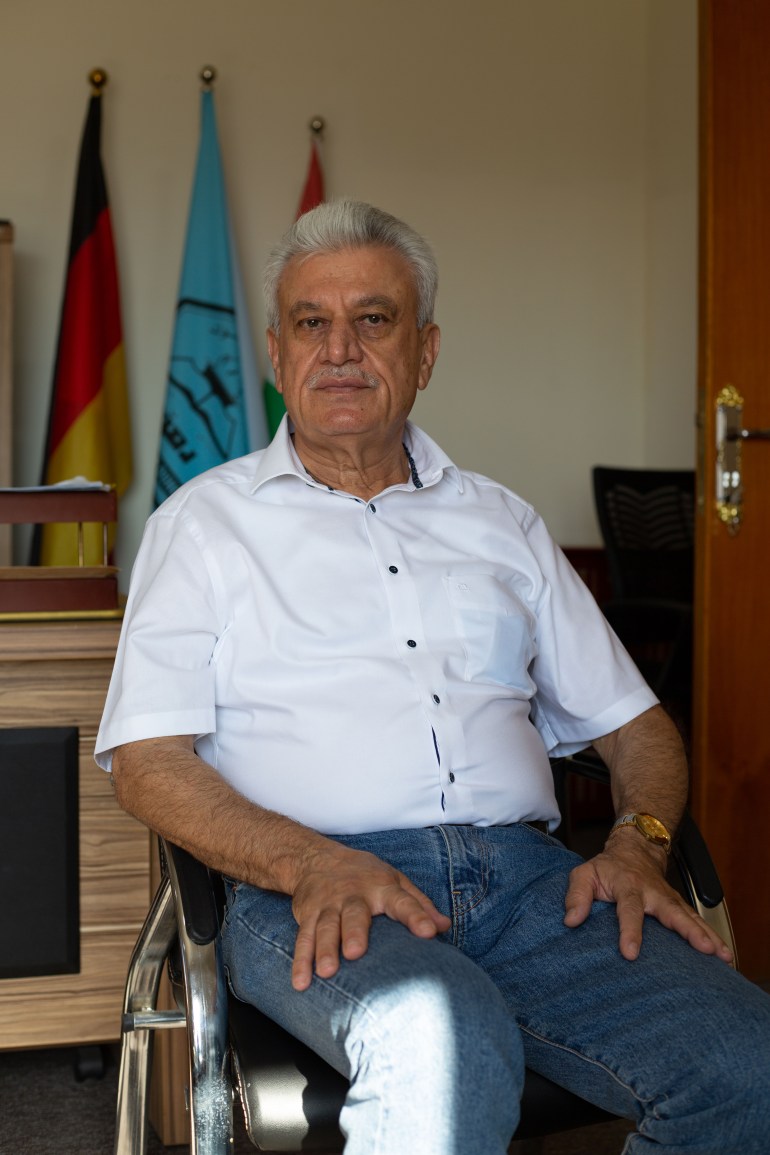
The necessity is immense. Within the Kurdish area of northern Iraq, the place it was estimated in 2017 that multiple million folks had been displaced by violence, just a few dozen native psychologists are treating sufferers.
At present, a handful of worldwide NGOs supply psychological well being help to folks within the camps, however since they’ll solely deal with a restricted caseload they refer many circumstances to the IPP, says 30-year-old Shaima Namiq, a graduating pupil who has labored with 200 sufferers over the previous three years.
Namiq says the psychosocial help NGOs supply just isn’t suited to the severity and breadth of the problems within the camps, particularly look after feminine victims of sexual violence, for whom the influence of the trauma “has now grown better than some elements of the particular occasion”.
“There are such a lot of completely different wars in Iraq. It’s laborious to know the place the true trauma begins,” she says.
No psychotherapists are based mostly inside the Duhok camps, and many of the displaced folks can not afford the hour’s drive to the town centre. College students go to the camps as a part of their minimal 1,200 hours of internship and the hotline helps establish those that want pressing care.
The stigma round psychological well being is a tricky impediment. “Individuals suppose if somebody goes to the clinic for psychotherapy, they’re loopy, particularly if it’s a lady,” Namiq says. However phrase is slowly getting out and increasingly more persons are reaching out after listening to good studies from others locally.
Accessing blocked feelings
On the Harman Group Centre close to the Khanke IDP camp, vibrant murals present butterflies and kids enjoying collectively underneath blossoming bushes.
Two IPP therapists, Prishang Omer Ahmed and Iran Abduljabar, sit on the finish of a desk in a quiet classroom with seven Yazidi ladies from a close-by camp. It’s time for his or her weekly psychotherapy session.
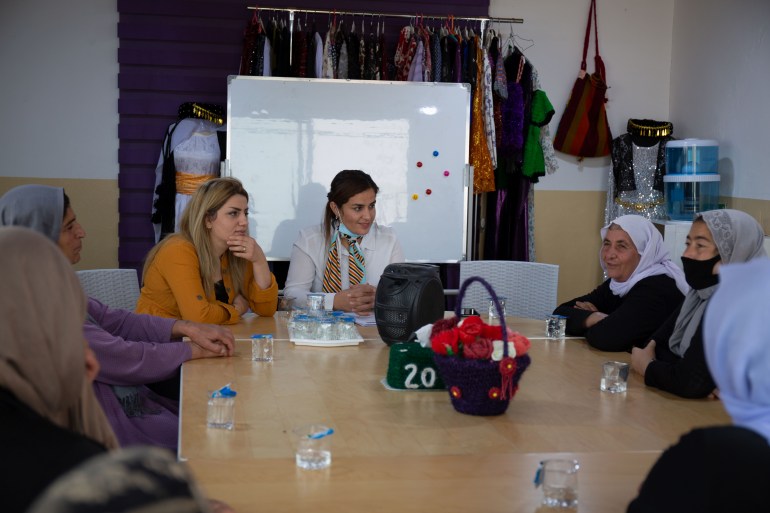
The seven Yazidi ladies are from Sinjar. Some fled as ISIL superior. Others have been held captive by ISIL however managed to flee, Ahmed explains. All are nonetheless searching for husbands and kids who have been kidnapped by ISIL.
“They don’t know something about them, and that is very hectic,” Ahmed, who was born in Iran and grew up in Erbil in northern Iraq, says. “It has blocked them from transferring ahead so we established this group session to assist them discover methods to heal.”
The IPP psychotherapists use an array of strategies to assist folks to deal with their trauma akin to cognitive behavioural remedy, imagery rescripting and a way referred to as NET, or narrative publicity remedy, which is often used with communities which have skilled political or ethnic violence. They assist the ladies tackle traumatic occasions by placing them within the wider context of their lives and developing with an autobiography that weaves in constructive experiences as effectively.
“Individuals attempt to keep away from their unhealthy reminiscences however by avoiding it, it by no means will get processed, so we open up the field, we take out the reminiscences and we put them again in a extra ordered and calm means,” says Terry Porsild, a Canadian psychologist who runs the IPP clinic because it opened in March 2021. She leads the clinic’s seven psychotherapists, who’ve all graduated from the IPP programme.
The sufferers are additionally taught leisure methods and to attempt to reside extra within the second. The session begins with music and the ladies are requested to shut their eyes and loosen up.
“It’s like sitting underneath a tree and listening to the sounds of the birds,” says one of many ladies, Layle, who knits whereas she talks.

After the comfort comes the energiser, the place the ladies are inspired to stretch and loosen their our bodies.
Then all people settles down and Ahmed encourages them to speak about methods to change nightmares and damaging imagery and ideas into constructive ones.
“All of us are pondering negatively as a result of our husband and kids are nonetheless in ISIL captivity, so we’re all excited about what occurred to them. We lie awake excited about them,” says Layle. “However now we have been practising controlling these ideas.”
Ahmed and Abduljabar draw an image of a desk on the whiteboard. Subsequent to the desk’s legs, they write down the issues that the ladies say maintain them robust after the horrors they’ve seen.
The ladies name out phrases: energy, persistence, perseverance, their youngsters, and so forth. On high of the desk, the psychotherapists write the negatives; homelessness, ISIL, no help within the camps, youngsters nonetheless in captivity, and an unstable financial state. These are the issues that the ladies have to debate and deal with, and it’ll not be a brief journey.
After the session, Ahmed takes a seat on the desk once more, adjusting her striped neck scarf as she leans ahead.
“Individuals in my group, and Yazidi ladies, specifically, have suffered a lot they usually wanted professionals to grasp them and help them to get well, so I needed to be this individual,” she tells Al Jazeera.
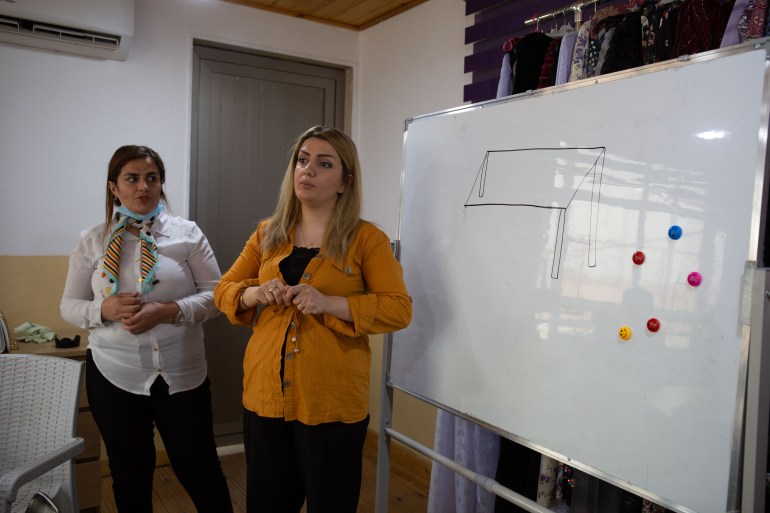
Ahmed had been finding out social work whereas wanting into therapies that may work for Yazidi ladies survivors when she heard in regards to the IPP programme and thought it might be the reply.
The primary case she labored on satisfied her that the remedy labored. Her affected person was a 46-year-old Yazidi lady who had been kidnapped alongside together with her household and held and tortured by ISIL for 2 years.
The lady managed to flee with three of her youngsters, however her husband and different youngsters have been nonetheless in captivity. “She was very depressed all day excited about her youngsters, what occurred to them, how they’re doing,” explains Ahmed.
Her PTSD signs decreased with remedy. “She was capable of cope and settle for what occurred and settle for that her youngsters could also be alive or lifeless,” says Ahmed.
At present, Layle believes strongly that her son remains to be alive, and she or he shall be returning to Sinjar quickly, hoping to reunite with him. Two different ladies from the remedy group have returned since August final yr, becoming a member of hundreds who’ve made that journey.
Ahmed stresses that these returnees would wish continued, constant care: “Of their return, they should really feel supported, persevering with remedy would strengthen their capacity to manage.”
A flower and a stone
One in every of Namiq’s circumstances within the camps is a 28-year-old lady affected by PTSD. She has extreme insomnia and infrequently fainted throughout remedy periods.
In 2014, ISIL kidnapped the girl and three others, and sexually abused them for 3 days. She escaped to the Kurdish area however nonetheless experiences nightmares and flashbacks.
“She thinks she is in the identical scenario as 2014 and that ISIS remains to be round her in that room,” Namiq says.
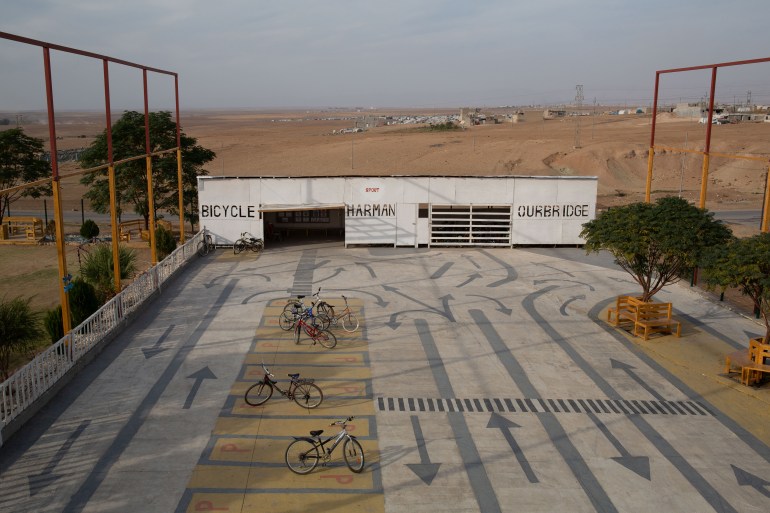
Namiq established a lifeline together with her by NET. Collectively they put a flower on the glad reminiscences in her life and a stone on the unhealthy ones.
“That is within the first session. After which, stone by stone, flower by flower, you’re speaking in regards to the occasions intimately in a protected place after which connecting this expertise to now,” says Namiq.
After 43 periods, the girl is now describing her nightmares in much less element. “When she used to speak in regards to the previous, her physique was struggling so much and she or he couldn’t management her crying. Now, she will speak calmly and her fainting has stopped,” says Namiq.
However Namiq worries that if the girl returns to Sinjar too quickly, her unhealthy reminiscences will flood again, particularly if she doesn’t have continued help. “It’s a long-term course of to deal with the layers,” she says.
Trauma is handed down by the generations
Talking to Al Jazeera, Kizilhan says his personal background as a refugee from a household with an intergenerational historical past of persecution was a part of the rationale he was drawn to trauma counselling.
Noting that his folks, the Yazidis, have skilled greater than 70 massacres over the past 800 years, he describes how he started researching transgenerational trauma in repeatedly persecuted communities after finding out drugs and psychology and incomes his PhD.
“These traumas are handed on from one era to the subsequent culturally, psychologically and biologically,” he says. “Solely once we perceive the historic traumas can we higher deal with the survivors of terror, conflict and genocide.”
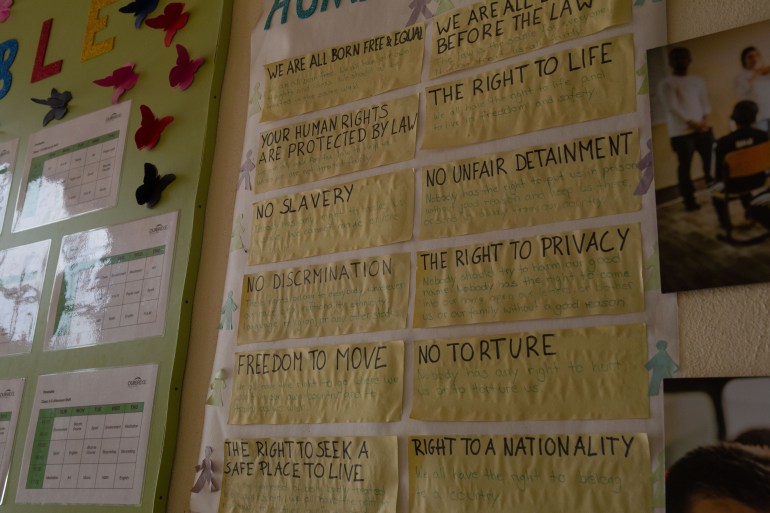
Kizilhan runs a division in a clinic within the metropolis of Donaueschingen, Germany, that treats refugees from Afghanistan, Iran, Iraq, Syria and different nations. He additionally trains UN employees and law enforcement officials and advises governments and establishments on this discipline.
He was invited to hitch an effort to deliver 1,100 Yazidi ladies and kids who have been traumatised by ISIL to Germany for therapy in 2015. Whereas this was necessary work, he realised it will be more practical to deal with folks on web site.
“It was clear to me that we will solely assist if now we have consultants on the bottom who may also help within the language of the survivors and on the background of their tradition in the long run,” he says. “Solely on this means can a society deal with the trauma … and reside in peace.”
Trying forward
The IPP is coaching a few of the college students to take the reins of the establishment – and even replicate its mannequin in different cities within the Kurdish area and southern Iraq.
“Our purpose is easy; to get extra psychotherapists working locally throughout Iraq,” says Othman, the assistant dean. He fled Iraq originally of the Iraq-Iran conflict in 1980 and returned to the Kurdish area in 2004 after realising the area was in determined want of psychological well being help.
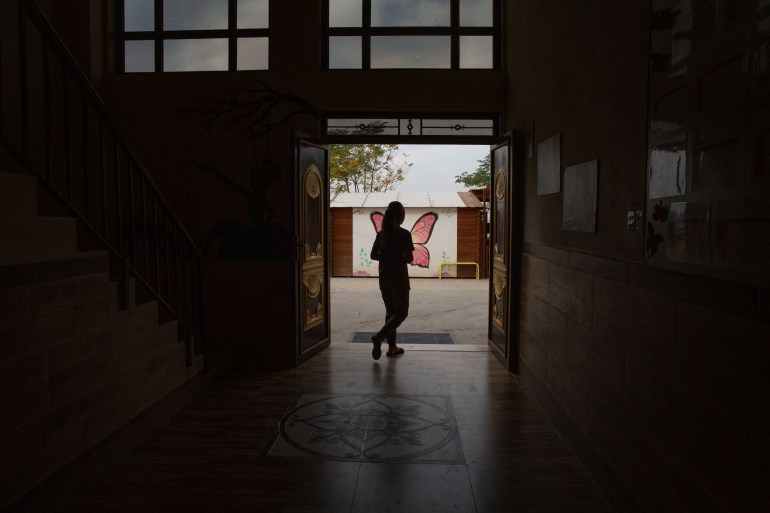
Whereas there’s a lengthy street forward to construct a pressure of specialists giant sufficient to deal with the bigger psychological well being disaster in Iraq, Othman sees nice potential. Most of their graduates are feminine, and he says ladies have a key benefit in specialised trauma remedy in Iraq.
“Girls wish to converse to ladies. And more often than not, males additionally wish to converse to ladies, as a result of they’re ashamed or embarrassed by their feelings. One thing they really feel they can’t share with a male psychotherapist.”
Sinjar lacks important psychological well being providers. Nonetheless, the IPP hopes to increase its programme to help the returning Yazidi group there in July. A handful of IPP college students will make the two-hour journey twice per week to proceed therapy for returnees.
On the Sinjar hospital, the worldwide emergency reduction group Cordaid ran a Psychological Well being and Psychosocial Assist (MHPSS) programme with one social employee and one psychiatrist, Dr Muzahim Mohammad Aboosh.
In October 2021, Dr Aboosh mentioned the clinic noticed as much as 50 sufferers per week, largely ladies and a handful of kids.
“Sinjar is slowly stabilising, however it’s nonetheless not protected,” he mentioned on the time. “It’s an surroundings that is stuffed with damaging reminiscences for Yazidis returning dwelling and we’re treating a number of layers of psychological well being issues.”
The clinic shut in December when Coraid’s programme got here to an in depth however Dr Aboosh continues his work as a psychiatrist in Nineveh. He’s not solely treating trauma from battle and displacement but additionally that which flares when Yazidis return to the place the place the ordeal started.





